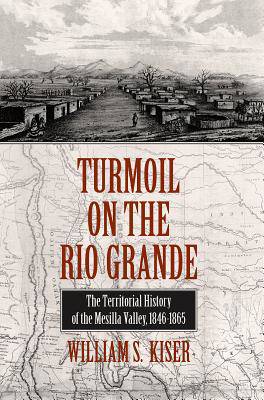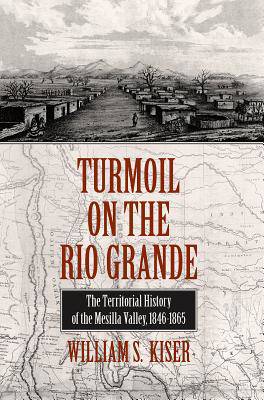
- Afhalen na 1 uur in een winkel met voorraad
- Gratis thuislevering in België vanaf € 30
- Ruim aanbod met 7 miljoen producten
- Afhalen na 1 uur in een winkel met voorraad
- Gratis thuislevering in België vanaf € 30
- Ruim aanbod met 7 miljoen producten
Omschrijving
The mid-nineteenth century was a tumultuous yet formative time for the Mesilla Valley, home to present-day Las Cruces, New Mexico. With the coming of the U.S. Army to Mexican territory in 1846, the region became the site of a continent-shaping power struggle between two rival nations.
When Mexican governor Manuel Armijo unexpectedly fled Santa Fe, he left the New Mexico territory undefended, and it fell to forces under Brigadier General Stephen Watts Kearny in a bloodless occupation. In the ensuing two decades, the southern portion of New Mexico's Rio Grande Valley played a prominent role in the conflict that overtook the infant American territory.
In Turmoil on the Rio Grande, William S. Kiser has mined primary archives and secondary materials alike to tell the story of those rough-and-tumble years and to highlight the effect the region had in the developing U.S. empire of the West. Kiser carefully limns in the culture into which the U.S. soldiers inserted themselves before going on to describe the armed forces that arrived and the actions in which they were involved. From the thirty-minute Battle of Brazito--in which the greenhorn recruits of the 1st Regiment of Missouri Volunteers, led by Col. Alexander Doniphan, vanquished Mexican troops through superior technology--to the Treaty of Guadalupe-Hidalgo, the international boundary disputes, and the Confederate victory at Fort Fillmore, Kiser deftly describes the actions that made the Mesilla Valley important in American history.
Specificaties
Betrokkenen
- Auteur(s):
- Uitgeverij:
Inhoud
- Aantal bladzijden:
- 304
- Taal:
- Engels
- Reeks:
- Reeksnummer:
- nr. 38
Eigenschappen
- Productcode (EAN):
- 9781623492045
- Verschijningsdatum:
- 12/09/2014
- Uitvoering:
- Paperback
- Formaat:
- Trade paperback (VS)
- Afmetingen:
- 152 mm x 226 mm
- Gewicht:
- 430 g

Alleen bij Standaard Boekhandel
Beoordelingen
We publiceren alleen reviews die voldoen aan de voorwaarden voor reviews. Bekijk onze voorwaarden voor reviews.











